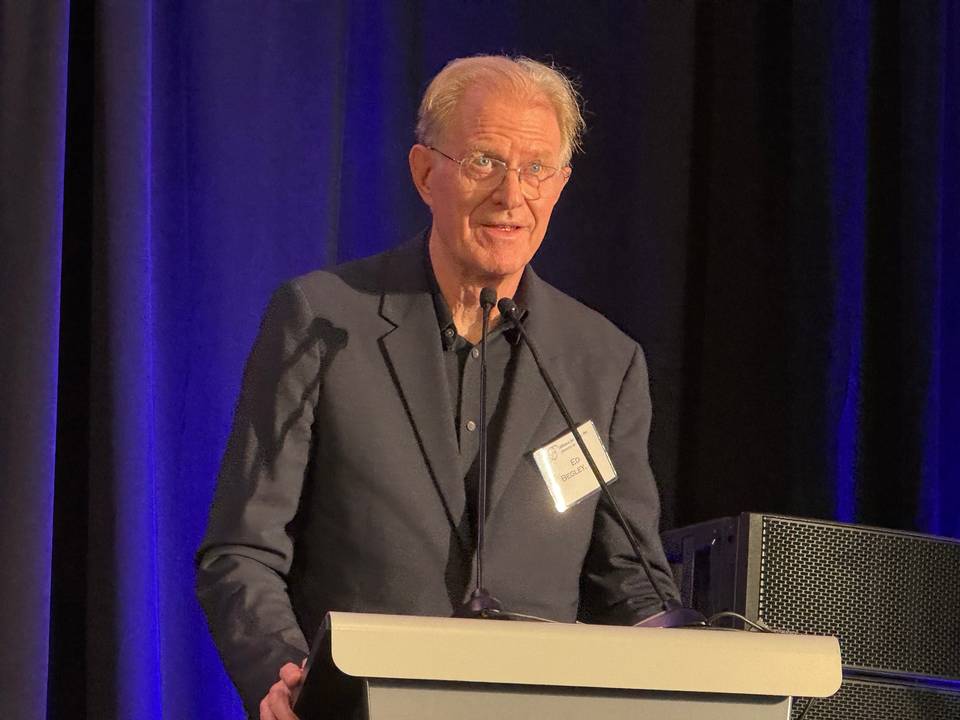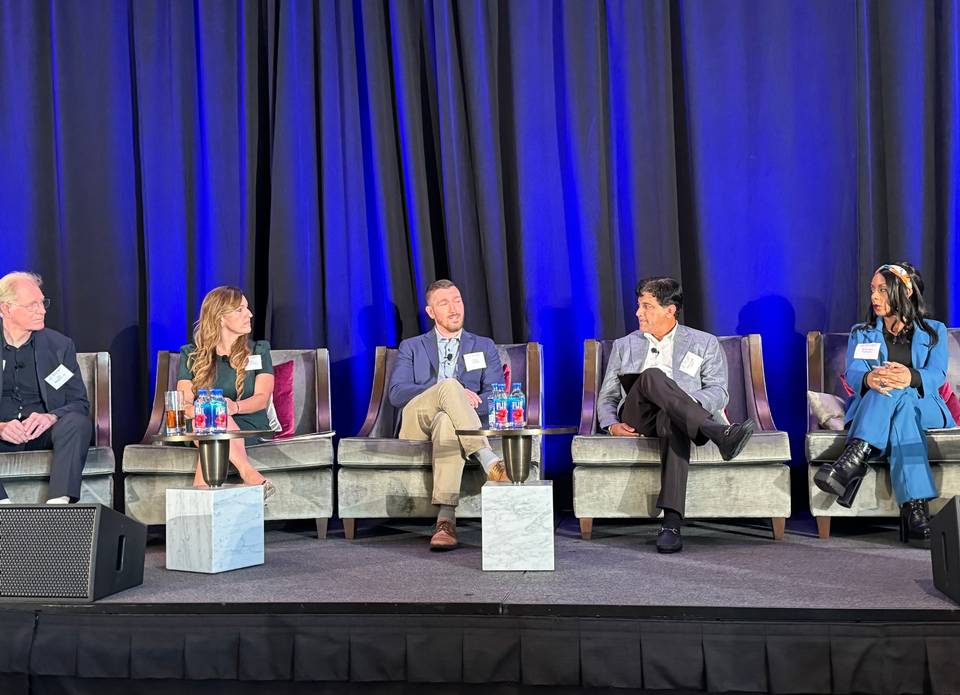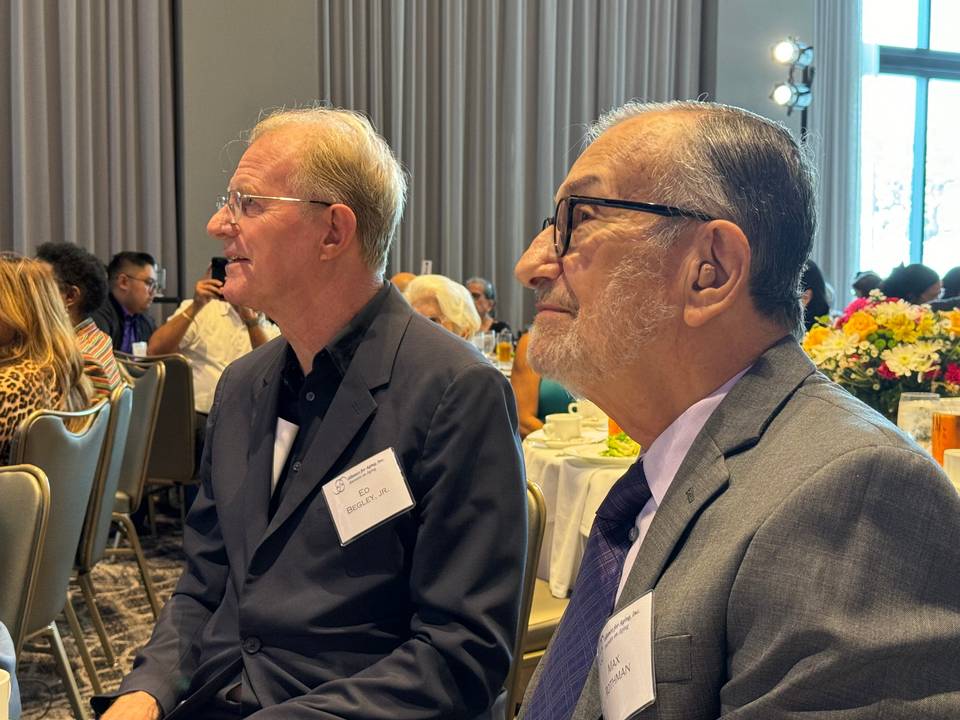What’s wrong with your brain? It could come down to what you need more of each night BY MICHELLE MARCHANTE JUNE 05, 2024 11:06 AM – Read the original article here.
Sleeping well can affect your brain health, reducing the risk for Alzheimer’s. Your home’s layout can indicate your fall risk. Tips for healthy aging from Miami conference.
How well you sleep can say a lot about your brain health.
Stress, blue light, even the time you go to bed are known to affect the quality of your sleep. And as you age, you might find yourself waking up through the night.
“Poor sleep can impact you in so many different ways but you can also be the one to take charge,” said Arlener Turner, a research assistant professor of psychiatry and behavioral sciences at the University of Miami Miller School of Medicine.
The good news: “Sleep is modifiable,” she said.
Turner, who is studying how disturbed sleep can increase the risk for cognitive decline and Alzheimer’s disease, is one of several experts who spoke at “The New Face of Aging” conference, hosted in May by Alliance for Aging at the Loews hotel in Coral Gables.
And sleep was central to this year’s discussion on healthy aging.
“Sleep is unequivocably one of the pillars of health today,” said Dr. Rosie Curiel Cid, a neuropsychologist at the University of Miami Miller School of Medicine who specializes in neurodegenerative conditions in at risk older adults. “Sleep has so much research behind it now that we know that it’s not only essential for your brain health, it’s also related to neurodegenerative processes and the acceleration of some of these processes.”
Here are key takeaways:
5 TIPS TO SLEEP BETTER AT NIGHT
Disrupted sleep patterns are common in people with neurodegenerative conditions. But it’s also important to know that waking up a few times during the night is normal, as long as you still feel refreshed in the morning, according to Turner.
If you think you’re waking up too frequently every night, use a calendar to track your sleep cycle, including how many times you wake up in a night, and an estimate of how long it takes you to fall back asleep every time you wake, Turner told the Miami Herald. This data can help doctors determine if you have a sleep disorder.
Trust your gut, too: “You’re the expert on you” so you’ll know when something feels wrong, Turner said.
While you should talk with a sleep specialist if you’re noticing a pattern of sleep issues — like if it takes you more than an hour, for example, to fall back asleep every time you wake up — here are five things Turner says can help improve your sleep:
- Exercise: Studies show exercise helps people fall asleep more quickly and improves sleep quality. However, some people say they struggle to sleep if they exercise close to bed time. Exercising earlier in the day can help avoid this, plus, it reduces your risk of feeling too tired to work out after a busy day.
- No caffeine before bed: Don’t drink coffee or other caffeinated drinks five hours before bed, according to Turner.
- Don’t use blue light devices at bedtime: During the hour before bed, don’t watch TV, scroll through social media on your phone, read an e-book on your tablet or use other devices that emit blue light. Blue light messes with your sleep cycle by tricking your brain into thinking it’s daytime, stopping the release of the sleep hormone melatonin, research shows. If you can’t peel yourself away from your electronics, consider wearing blue-light glasses that are meant to help filter out blue light. Cellphones, including Android and iPhone, usually have a night setting that removes blue light from your phone’s display, too.
- Set a bed time and stick with the schedule: It’s recommended people get seven to nine hours of sleep. However, as you age, the way you sleep changes, too, according to Turner. Maybe you used to feel sleepy at midnight. Now your body is tired at 9 p.m. Maybe you need naps throughout the day. Pay attention to what your body is telling you.

Actor Ed Begley, Jr. was the keynote speaker at the 2024 “New Face of Aging” conference hosted by the Alliance for Aging in Coral Gables, FL on May 30, 2024. Michelle Marchante mmarchante@miamiherald.com
TIP: Waking up early is a common part of aging. If your body no longer lets you sleep past 5 a.m., don’t stay in bed, trying to force yourself to sleep. Instead, get up and be productive, starting your tasks earlier in the day. Actor and activist Ed Begley Jr., who was diagnosed with Parkinson’s disease in 2016 and was the Miami conference’s keynote speaker, said he wakes up at 4:30 a.m. and goes to the gym at 5:30 a.m. ▪
- Nap, but keep it short: If you like to nap, set an alarm to make sure your siesta does not exceed 30 minutes to avoid disrupting your sleep cycle, according to Turner.
UPGRADE YOUR HOME FOR AGING
The air you breathe, the food and drinks you consume, where you sleep, and the habits you have can all affect your health. But it’s not just diet and exercise changes that can help you live a healthy life. You should look at updating your home as you age, according to Dr. Narendra Kini, an ER and trauma doctor that previously served as the chief medical officer of Florida’s COVID-19 Infectious Disease Field Hospital System and as the chief executive officer for Nicklaus Children’s Hospital near South Miami.
“The house that you bought when you were 30 no longer serves you when you’re 55,” Kini said.
When it comes to aging at home, getting out of the shower, getting out of the bed, and having steps in your homes are not the only risks for slips and falls.
Just like mattress quality and how dark your bedroom is at night can determine how well you’ll sleep, other factors in your home’s design can indicate your risk for injuries and inflammation, according to the doctor.
The height of your coffeemaker. How far you need to bend to open a drawer or to plug in your phone’s charger to the power outlet. While people might not think about it, these are some areas of the home, that when combined with the strength of your joints, can be indicators of your risks for falls, Kini said.
And as you get older, your immune system might not react as well to your favorite scented lotions, shampoos and cleaning products, according to Kini. If you’ve noticed worsening allergies, for example, consider the combination of cleaning products you use, the carpet, and the paint in your home, he said.
“That soup you create when you clean your home, as an example, is a predictor of what happens to your respiratory system,” Kini said.

Sleep was a hot topic during the 2024 “New Face of Aging” conference hosted by the Alliance for Aging in Coral Gables on May 30, 2024. Panelists (left to right) include actor and activist Ed Begley, Jr.; Dr. Rosie Curiel Cid, associate professor of psychiatry and behavioral sciences at the University of Miami Miller School of Medicine; Cognivue President Paul Estes; Dr. Narendra Kini, former chief medical officer of Florida’s COVID-19 Infectious Disease Field Hospital System; and Arlener Turner, a research assistant professor of psychiatry and behavioral sciences at the University of Miami Miller School of Medicine. Michelle Marchante mmarchante@miamiherald.com
BE YOUR OWN HEALTH ADVOCATE
Know that 40 isn’t just the new 30. Mid-40s is the time for people, regardless of their personal risk factors for neurodegenerative conditions, to focus on their cognitive health and create healthy lifestyles, if they haven’t already, to help slow cognitive aging, according to Curiel Cid, the UM neuropsychologist. By 2030, the baby boom generation — people born between 1946 and 1964 — will be 65 or older. The previously largest population group in the country will not only be at retirement age then.
By 2030, all baby boomers will be in the age group that has the highest risk of developing Alzheimer’s and other memory-robbing conditions.
It’ll bring a new challenge to an already overwhelmed U.S. healthcare system that is facing staffing shortages and doesn’t have enough providers to meet the expected demand for senior care, panelists said.
This makes it more important then ever for people to be proactive about their health. Experts are encouraging people to pay attention to their health and speak with their doctors if they notice any possible health concerns.
“There is no cure for Alzheimer’s disease, but it is a new era of treatment,” said Curiel Cid.

(Left to right) Actor Ed Begley, Jr. and Alliance for Aging President and CEO Max B. Rothman at the annual “New Face of Aging” conference on May 30, 2024. Begley, who is diagnosed with Parkinson disease, was the conference’s keynote speaker. Michelle Marchante mmarchante@miamiherald.com.
The U.S. Food and Drug Administration last year fully approved the monoclonal antibody Lecanemab, sold under the brand name Leqembi, to help slow the disease progression in people with early Alzheimer’s. It also gave accelerated approval last year to another similar Alzheimer treatment, Aducanumab, sold under the brand name Aduhelm. Many more drugs are also undergoing testing as researchers try to find ways to manage symptoms and slow decline.
However, Biogen, the drugmaker behind both treatments, is discontinuing Aduhelm, which was undergoing a clinical trial as part of the process needed to get full FDA approval. Biogen, in a statement, said the decision was “not related to any safety or efficacy concerns” and was made so it could focus more on the advancement of Leqembi and the development of other treatments for Alzheimer and other dementia.
“There is no massive disease modifying therapy, there is no cure, and there is no infrastructure, which is why everything that is being said here is so important because you have to be the agent of change to make sure that you are taking care of yourself and your family and doing everything you can to age well,” Curiel Cid said.
Besides eating healthy, exercising and sleeping well, Curiel Cid recommends people make sure to keep their brain active, a key factor in healthy aging. Learn a new language. Practice playing an instrument. Read books. Join a club. And find ways to be social.
All of these activities engage your brain, she said, and is key to healthy aging.
MICHELLE MARCHANTE
Michelle Marchante covers the pulse of healthcare in South Florida. Before that, she covered the COVID-19 pandemic, hurricanes, crime, education, entertainment and other topics in South Florida for the Herald as a breaking news reporter. She recently won second place in the 73rd annual Green Eyeshade Awards for her consumer-focused healthcare stories and was part of the team of reporters who won a 2022 Pulitzer Prize For Breaking News in the Herald’s coverage of the Surfside condo collapse. Michelle graduated with honors from Florida International University and was a 2020-2021 Poynter-Koch Media & Journalism fellow. Support my work with a digital subscription
Read more at: https://www.miamiherald.com/news/health-care/article288974020.html#storylink=cpy

